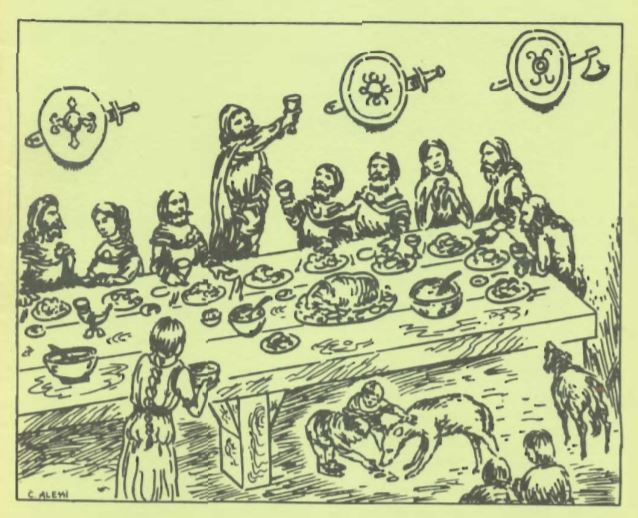
from The Runestone Spring 1982 #39
Only in a world as rotten and degenerate as the one
in-which we live would it be necessary to state the obvious. Yet there are those who say that it is better to be weak than to be strong, even those who say that to be’strong is to be evil and that to be weak, somehow, is to be virtuous. Odinists are not counted among that number!
The prophets of weakness are not always forthright in proclaiming their message. It may be hidden beneath banners
of pacifism or in the curbing of even normal childhood aggressions or in the smirking pride that some few actually take in their lack of physical capability. In its muted form the worship of weakness finds its purest expression in personalities who seek to pull down all greatness, all strength, all the exceptional elite who would rise above the herd. The sickness does not discriminate on the basis of sex; “traditional” women who, unlike their sisters in the sagas, are told that they are weak and incapable, carry it in their breasts. Likewise men who use the “it’s okay to cry” cop-out and who eschew anything remotely related to classical male strengths are also badly contaminated by the virus . The philosophy of weakness naturally thrives in a decaying social body; after all, it’s easy to be weak – until you have to compete with the strong.
Where did all this start? There have always been the weak. But weakness as a virtue seems to be strongly linked with the coming of Christianity. Obviously. not all who profess Christianity are, or were, weak. Christ may or may not have been the pallid peace-monger modern liberals worship, but he does seem
to have had a touch of masochism. Anyone who could make the famous statement about turning the other cheek is – far from being some enlightened guru – a person badly out of touch with their own instincts and hence cut off form wisdom, Many modern Christians seem to suffer from the same lack of wholeness. The Spiritually lifeless wights who forgive monsters who have murdered and mutilated their own sons and daughters, and who do so in the name of Jesus, are an extreme example. More common are stalwarts in their daily lives, but who excuse their lack; of action at times of crisis by appealing to Christian love,
or Christian charity or Christian tolerance.
Noted Christian writer Malcolm Muggeridge was expressing
a many-leveled opinion when he said that:
“We are henceforth_(since the crucifixion) to worship defeat, not victory; failure, not success; surrender, not defiance; deprivation, not satiety; weakness, not strength.”
More to our liking were the fiery Crusaders who; for all their faults and follies, were still untamed. The primal instincts of the Northern European soul lived. in them despite, not because of their Christianity.They were still Nietzsche’s
“blond beasts”, their lips called out to Jesus but Odin had their hearts.
But why settle for such a compromise? Odinists can look back on a long line of heroes and warriors who were proud of their strength, not ashamed of it. Feats of physical strength abound in the old sagas • the fantastic was the ideal which the common man sought to emulate in real life. Spiritual strength was honored every bit. as much as might of limb. Perseverance, power of will, total control and coolness in the face of danger and death · all of these virtues were praised, and all exemplify a kind of strength.
Look at the very gods of Odinism, Not_one is a weakling. Mighty Thor is especially a god of strength. His sheer physical prowess is an inspiration to all who would reject weakness. Odin epitomizes another sort of strength, that of the will and the spirit.
Likewise, modern Odinists know that strength is never out dated. Most people accept the illusion that there is something out there called”civilization” • that the police will protect us from all harm · that physical strength and the spiritual strength to wield it are no longer necessary. But ask anyone who has been mugged or raped. Some victims can’t reply;they’re dead.
Odinists know that strength is better than weakness.
Strength doesn’t mean arrogance or crudity, in fact, only the strong can really afford to be gentle. Strength means life and health. Strength means fulfillment of our potential, individually and collectively. To be strong is to be vibrant, wholly alive, on the very cutting edge of life. Why settle for less?
Let the Malcolm Muggeridges of the world worship weakness and hate all that is healthy and life•giving. Odinists, true to .themselves, their ancestors, and their own instincts ,will respond to life’s challenges and wax from strength to strength. We know that, in truth, the strong will inherit the Earth – we, and our descendants, will be strong!
